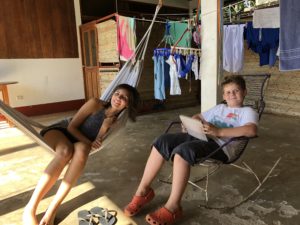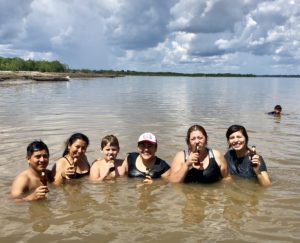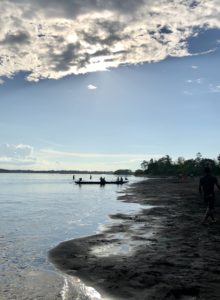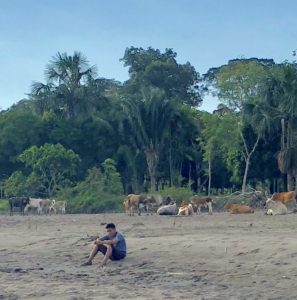I am spoiled by having the Internet here, and I sometimes forget how isolated this place is. I did not shut off my digital subscription to the New York Times, so my iPhone is still sending me alerts about Paul Manafort and Michael Cohen, but for everyone else, they are far away from everything.
Yesterday I admitted a patient with advanced AIDS, a 35 year old woman who was discharged three weeks ago from the hospital in Iquitos with tuberculosis in the brain. She went home to the house where she lives with her husband and his parents (her two young daughters live with her mother) but apparently her husband and his family are all big drinkers; she did not take her TB meds or HIV meds, so she came in obtunded, moaning in pain, her tongue coated in Candida and her back speckled with Kaposi sarcoma. Her CD4 count in July was 71, which is very low. It means that her AIDS is advanced and that she could have any kind of opportunistic infection.
I thought for sure the patient would be transferred to Iquitos. We have no Xray here, no CT scan, limited blood tests and a limited number of tests for blood, urine and stool. In Chicago, this patient would have been admitted to the HIV team, and probably to the ICU. But patients need family members to help them with the six hour boat ride to Iquitos. I say, “six hours to Iquitos”, but really it is five hours to Mazan, then climbing some steep steers from the dock to the town, taking a 15 minute mototaxi ride across the isthmus to shave a couple of hours off the boat ride, and then another hour to Iquitos. I had trouble navigating those steep stairs myself, with my overstuffed backpack and my suitcase. Patients need a companion. If they are sick enough to be transferred to Iquitos, they are very sick, and a family member needs to help them up the stairs. Some patients are strapped to a rigid gurney, like the 44 year old woman who came in the previous night with a massive stroke. She came in at 11 pm having collapsed suddenly at home. She was unresponsive, had a blood sugar of 500, with pinpoint reflexes and a + Babinski on the right, all suggestive of a massive stroke. We gave her some fluids and some insulin and waited until morning until she could be strapped to a rigid plastic red gurney and brought down many flights of stairs to the Santa Clotilde medical boat, to begin the long journey to Iquitos. She is the wife of our night watchman; it felt terrible to be able to do so little.
In the case of the woman with AIDS and altered mental status, Ana, our medical director, told her mother: “You must talk among yourselves and figure out who will be in charge of her.” To bring her on that long journey to Iquitos, possibly to stay with her in Iquitos for several weeks while she is hospitalized.
Upon admission, Liz was too sick to speak, so I asked her mother who would be responsible for her. (There is a space that must be filled in on the admission packet, but it is, of course, a good thing to know). “Usted?” I asked, because her parents and her sisters seemed very involved. “No, it needs to be her husband, of course!” But the husband has not yet come to see his very sick wife. And they cannot bring her to Iquitos without a companion. Her mother just had abdominal surgery, her father works long hours, her sisters have small children. And so she must stay in our hospital, as sick as she is.
Transportation is such a big deal here. People might live two days upriver by “peke-peke”, the homemade dugout canoes with a gasoline motor attached. “No tengo gasolina!” cried Irma when she knew her husband was dying and she wanted to bring the body back to Aushiri. Irma is Kichwa (related to but distinct from Quechua). She wore a cheerful pink skirt. Her one year old son nursed as he hung from her shawl. She and her husband Gerbacio had never heard the word “cancer” and did not know what it meant, but they knew something was wrong when he lost 40 pounds and had trouble breathing. They took a peke-peke all the way from their village, two days away. When I met him, he was cachetic and his belly was swollen with ascites; his intercostal muscles working visibly pulling at his ribs to help him breathe. We removed some fluid from his belly, but the fluid accumulated in his lungs and he struggled to breathe. We tried to remove some fluid from his lungs without success. He drew his last breaths, buffered by morphine. It was his son’s first birthday.
Omer can’t affort the gasoline. He is two years old and has been here for two weeks. He has had high fever the whole time he has been here. We think he might have an abscess in his liver, because his stool showed Entoamoeba histolytica even after he completed a course of metronidazole. He is quite sick, but not sick enough to be transported emergently, and his mother Karla has no money for gasoline. She worries about her Omer’s two year old twin, who is home back in Diamante Azul being cared for by his eleven year old sister. His father is not around; he was an abusive man who drank too much.
There are little thatched-roofed huts on stilts that announce in handwritten signs: “se vende gasolina”. People bring large open containers down to the docks to fuel their boats. At least, as Declan has noticed, absolutely no one smokes.
But it can’t be good to live around so much gasoline. Liz is a young doctor from Lima who is trying to match into an American pediatrics residency. She is here for two weeks doing some lead screening for kids who live in this area. Here in Santa Clotilde, most people collect rainwater for drinking water, but in many smaller communities, people drink from the Napo. We bathed in the Napo last Sunday, which was lots of fun with beer and volleyball and good-natured colleagues, but the toilets on all the riverboats empty directly into the Napo: when you enter the lavatory on the boat, you look straight down the toilet bowl into the river flowing below you. And all the gasoline on the Napo….
But the river is the only mode of transport; there are no roads (unless you count the very occasional propeller plane). I heard my first one today, and only then realized that I had not heard an airplane in almost two weeks. Ana told me that the only people who have propeller planes are the narcotraficantes.
And people have to go places, and get things, and the river is how they do it. I grumble mentally about the lack of groceries here: everything seems to be some combination of chicken, eggs, and rice. Anything else must be brought from Iquitos. And while one part of my brain worries about all the effects of too much gasoline on the river, the other part of my brain is trying to figure out who in Santa might be going to Iquitos anytime soon, who might be able to bring me back some coffee or olive oil or granola or

with Melanie, the Dutch doctor from Holland, on our porch

enjoying an afternoon (and a beer!) on the River Napo!

peke-peke at the river’s edge

Declan has many mosquito bites! (so do I …)

water buffalo at the river’s edge
Wow Juliet. So fascinating. I love hearing about the medicine but also about everyday life, your home, what you are eating. You are so courageous.
Comments are closed.